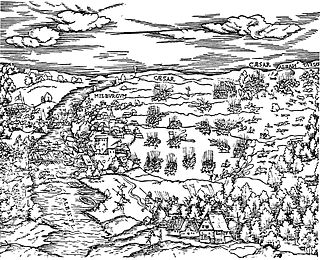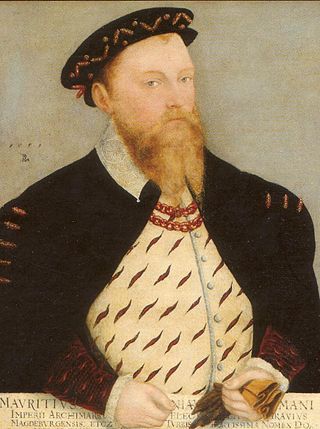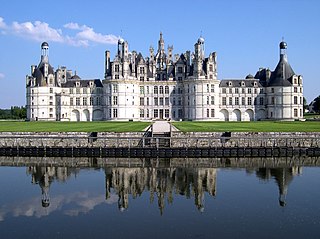
The Schmalkaldic League was a military alliance of Lutheran princes within the Holy Roman Empire during the mid-16th century. It received its name from the town of Schmalkalden, which is located in modern Thuringia.

The Protestant Union, also known as the Evangelical Union, Union of Auhausen, German Union or the Protestant Action Party, was a coalition of Protestant German states. It was formed on 14 May 1608 by Frederick IV, Elector Palatine in order to defend the rights, land and safety of each member. It included both Calvinist and Lutheran states, and dissolved in 1621.

Philip I, Landgrave of Hesse, nicknamed der Großmütige, was a German nobleman and champion of the Protestant Reformation, notable for being one of the most important of the early Protestant rulers in Germany. He was one of the main belligerents in the War of the Katzenelnbogen Succession.

The Battle of Mühlberg took place near Mühlberg in the Electorate of Saxony in 1547, during the Schmalkaldic War. The Catholic princes of the Holy Roman Empire led by the Holy Roman Emperor Charles V decisively defeated the Lutheran Schmalkaldic League of Protestant princes under the command of Elector John Frederick I of Saxony and Landgrave Philip I of Hesse.

The Schmalkaldic War was fought within the territories of the Holy Roman Empire between the allied forces of Charles V, Holy Roman Emperor and Maurice, Duke of Saxony against the Lutheran Schmalkaldic League, with the forces directly loyal to Charles fighting under the command of Fernando Álvarez de Toledo, 3rd Duke of Alba.

John Frederick I, called the Magnanimous, was the Elector of Saxony (1532–1547) until he was deprived of this title in the Capitulation of Wittenberg by Charles V, Holy Roman Emperor. He was leading the Schmalkaldic League, a military alliance of Lutheran principalities.
The Peace of Passau was an attempt to resolve religious tensions in the Holy Roman Empire. After Emperor Charles V won a victory against Protestant forces in the Schmalkaldic War of 1547, he implemented the Augsburg Interim, which largely reaffirmed Roman Catholic beliefs. This angered many Protestant princes, and led by Maurice of Saxony, in January 1552 several formed an alliance with Henry II of France in the Treaty of Chambord. In return for French funding and assistance, Henry was promised lands in western Germany. In the ensuing Princes' Revolt, also known as the Second Schmalkaldic War, Charles was driven out of Germany to his ancestral lands in Austria by the Protestant alliance, while Henry captured the three Rhine Bishoprics of Metz, Verdun and Toul.

Maurice was Duke (1541–47) and later Elector (1547–53) of Saxony. His clever manipulation of alliances and disputes gained the Albertine branch of the Wettin dynasty extensive lands and the electoral dignity.
The Diet of Speyer or the Diet of Spires was an Imperial Diet of the Holy Roman Empire in 1526 in the Imperial City of Speyer in present-day Germany. The Diet's ambiguous edict resulted in a temporary suspension of the Edict of Worms and aided the expansion of Protestantism. Those results were repudiated in the Diet of Speyer (1529).
Protestant League may refer to:

The Treaty of Chambord was an agreement signed on 15 January 1552 at the Château de Chambord between the Catholic King Henry II of France and three Protestant princes of the Holy Roman Empire led by Elector Maurice of Saxony. Based on the terms of the treaty, Maurice ceded the vicariate over the Three Bishoprics of Toul, Verdun, and Metz to France. In return, he was promised military and economic aid from Henry II in order to fight against the forces of Emperor Charles V of Habsburg.

The European wars of religion were a series of wars waged in Europe during the 16th, 17th and early 18th centuries. Fought after the Protestant Reformation began in 1517, the wars disrupted the religious and political order in the Catholic countries of Europe, or Christendom. Other motives during the wars involved revolt, territorial ambitions and great power conflicts. By the end of the Thirty Years' War (1618–1648), Catholic France had allied with the Protestant forces against the Catholic Habsburg monarchy. The wars were largely ended by the Peace of Westphalia (1648), which established a new political order that is now known as Westphalian sovereignty.

Wolfgang, Prince of Anhalt-Köthen, was a German prince of the House of Ascania and ruler of the principality of Anhalt-Köthen. He was one of the earliest Protestant rulers in the Holy Roman Empire.
The Augsburg Confession, also known as the Augustan Confession or the Augustana from its Latin name, Confessio Augustana, is the primary confession of faith of the Lutheran Church and one of the most important documents of the Protestant Reformation. The Augsburg Confession was written in both German and Latin and was presented by a number of German rulers and free-cities at the Diet of Augsburg on 25 June 1530.

John, known as John the Steadfast or John the Constant, was Elector of Saxony from 1525 until 1532 from the House of Wettin.

Philip I, Duke of Brunswick-Grubenhagen was a member of the House of Guelph. He was ruler of the Principality of Grubenhagen. He was the second son of Duke Albert II of Grubenhagen and his wife Elizabeth, née Countess of Waldeck. Philip was the last member of the Grubenhagen line to use the title Duke of Brunswick. His successors used the title Duke of Brunswick and Lüneburg, like most other princes of the House of Guelph.

The League of Dessauer was a short-lived Association of Catholic rulers in northern Germany during the time of the German Reformation. Its goals were to stop both the rebellion and the proliferation of Martin Luther's teachings. The League was founded in Dessau on 19 July 1525 and was led by the strictly Catholic widow and regent princess Margaret of Münsterberg.

George I of Württemberg-Montbéliard, nicknamed "the Cautious" was a son of Henry of Württemberg and his second wife, the Countess Eva of Salm.
An imperial election was held in Frankfurt on 28 November 1562 to select the emperor of the Holy Roman Empire.

The Second Schmalkaldic War, also known as the Princes' Revolt, was an uprising of German Protestant princes led by elector Maurice of Saxony against the Catholic emperor Charles V that broke out in 1552. Historians disagree whether the war concluded the same year with the Peace of Passau in August, or dragged on until the Peace of Augsburg in September 1555. The Protestant princes were supported by King Henry II of France, who was a Catholic, but sought to use the opportunity to expand his territory in modern-day Lorraine.














